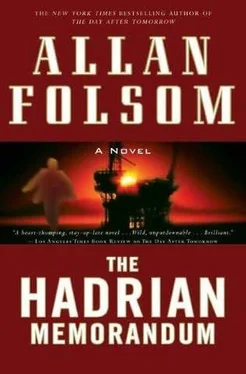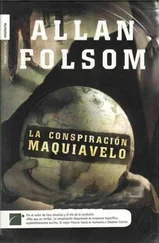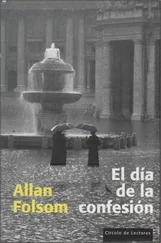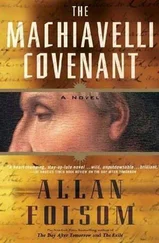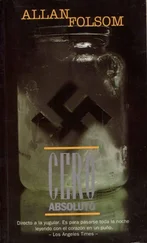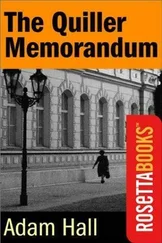Marten said nothing. Then, with a glance at the major, he turned and walked out the door.
5:40 P.M.
THE HOTEL MALABO. 6:30 P.M.
Nicholas Marten stood in a tiny shower stall that was crammed, like the toilet, into a corner of his room. Head back, his eyes closed, he let the water run over him, relieved beyond imagination to be free of his army interrogators and on his way out of Bioko. At the same time, he thought of the cold bravado with which the hawk-faced soldier had told him of the village massacre.
How many had lived in that village? Sixty? Eighty? Maybe more. He wondered what was so extraordinarily valuable to the army about those photographs that they would expend so much effort and take that many lives trying to retrieve them.
The only answer that made sense was that they wanted them as proof to the world that an outside force was fueling the rebellion and that their deliberate actions in repressing it-highly criticized by human rights groups, the United Nations, and any number of countries-were justified. Still, if they were so eager to uncover the pictures and had not yet found them, why had they suddenly stopped their interrogation and let him go?
Part of the puzzle might have been the condition of his hotel room when he returned. The place had been thoroughly ransacked. Every piece of his personal belongings gone through, his bed stripped, the furniture turned over. They hadn’t found the photos there, and they hadn’t found them on his person, but that didn’t answer the question of why they had let him go when they could have as easily killed him and buried his body somewhere in the rain forest where a missing man, no matter who he was, would never be found. A missed communication between them? Maybe. Goodwill? Not from men like that, particularly when they knew he’d seen firsthand what the army did to old priests and young boys and boasted about their slaughter of the villagers. So their freeing him had to have been for some other reason altogether. What that was he couldn’t imagine.
7:10 P.M.
Freshly shaven and dressed in a clean shirt, jeans, and sport coat, Marten left his bags at the front desk and headed for the bar. He walked gingerly, his balls still swollen and achingly tender from the field-goal-like kick presented to him by the major’s “specialist.” What he wanted most was to have a gin and tonic, or two or three to kill the pain, and then get the hell out of there on the ten-o’clock flight to Paris. Yet suddenly there was doubt even about that. In the last half hour a tropical storm had whirled in from nowhere. Wind and rain pelted in never-ending sheets. The lights flickered and went off, then came back on. He’d been warned at the desk that the airport might close down.
“For how long?” he’d asked of the white, middle-aged desk clerk.
“For however long the storm lasts, señor. An hour. A day. A week.”
“A week?”
“Sometimes, yes,” the man grinned.
“The airport closes, you make sure I have a room. I don’t want to sleep here in the lobby for a night, much less a week.”
“I don’t know if that is possible, señor.”
“You don’t?”
“No, señor.”
Marten reached into his jacket, took out a small roll of bills, and handed him a ten-thousand-CFA-franc note, the currency of Equatorial Guinea, which was somewhere in the neighborhood of twenty U.S. dollars. “Now you do.”
“Of course, señor. If the airport closes you will have a room.”
“Good.”
Marten walked off and shuddered as he did. The last thing he wanted was to spend another hour, let alone a night or a week, here.
7:15 P.M.
Noise and tobacco smoke hit Marten like a wall as he walked into the riot that was the Hotel Malabo’s bar, a big, broad room furnished with rattan and packed to the walls with Westerners, most of them SimCo mercenaries and AG Striker employees. Both groups looked like they were straight out of central casting. The SimCo people were your classic badass tough guys, hard-drinking, cigar-smoking, black-T-shirt-and-camouflage-pants-wearing, shaved-headed combat veterans from probably a dozen different countries and as many wars. The Striker crew looked like field people-drillers, riggers, technicians, and the like. Most of them still wore their grease-and sweat-stained work clothes, lightweight jumpsuits with a big AG STRIKER company logo stenciled on the back, and unlike the SimCo people, not all were men.
Four women who looked like office staffers, folded umbrellas still wet from the rain hung over the backs of their chairs, sat at a nearby table drinking and talking among themselves, and once in a while looking off toward a hunky mercenary or oil driller. Here and there were unkempt-looking women. They wore low-cut, slit-to-the-thigh dresses like uniforms and took up space at the long mahogany bar or sat at cheap rattan cocktail tables working any man who would pay for their attention.
Then there were the rest. Mostly they were men, ranging in age from middle twenties to late sixties. The majority of them wore tropical suits with dress shirts open at the neck. Some of the younger ones wore jeans or khakis with golf shirts under wrinkled, lightweight sport coats. Judging from their languages they seemed to be European or South African. Within a circle of twenty feet Marten heard smatterings of English, German, Afrikaans, Spanish, and Italian. His experience in his not-so-many-years-removed life as a homicide detective on the Los Angeles Police Department told him most were quick-buck artists-gamblers, manipulators, and hangers-on, whores of all trades-drawn to anywhere there was fast money to be made. And his sense of things during the few days he had been there told him there was plenty to be made in Equatorial Guinea. The dealings would be in drugs, guns, human beings, information-by the bundle or in snippets-anything at all they could sell for profit.
Marten pushed around a large man in a sweat-stained white suit and was trying to find the most direct way to the bar when he saw Marita and her medical students squeezed around a small corner table. She smiled and waved when she saw him. He grinned and nodded in return. He hadn’t seen any of them since they had been separated and the soldiers had taken him off for interrogation, and he was happy to see they had been released and were safe. He stepped around two arguing AG Striker oil workers and went to their table.
“We were concerned about you, Mr. Marten,” Marita said as he reached the table. “Please sit down.”
“I’m alright, thanks.” They made room, and he sat down gingerly. “What about you? Everybody okay?”
“We’re fine,” Marita said, then looked at her young companions. “¿Sí?”
“Sí,” they nodded in agreement.
The four were people he knew only by their first names: the slim, ever-smiling Luis; baby-faced Rosa, a little overweight and looking like a wannabe executive secretary in oversized glasses and olive-colored sack dress; the quiet, chubby, seemingly overly serious Gilberto; and Ernesto, tall and gangly with an unruly mop of bright red hair and red Converse sneakers to match. Here, in this crowded, boisterous, smoke-filled room, surrounded by a crowd of hardscrabble players from a wholly different world, they looked a lot less like people who would soon be doctors than kids who should still be living at home and going to high school.
“They collected our things from the hostel where we were staying,” Marita added, “and then brought us here, saying they would pick us up at nine and take us to the airport. We were told to leave the island tonight. From what they said we will be on the same flight you are taking.”
“To Paris.”
“Yes.”
Читать дальше
